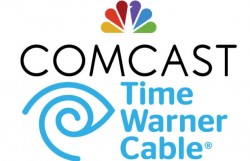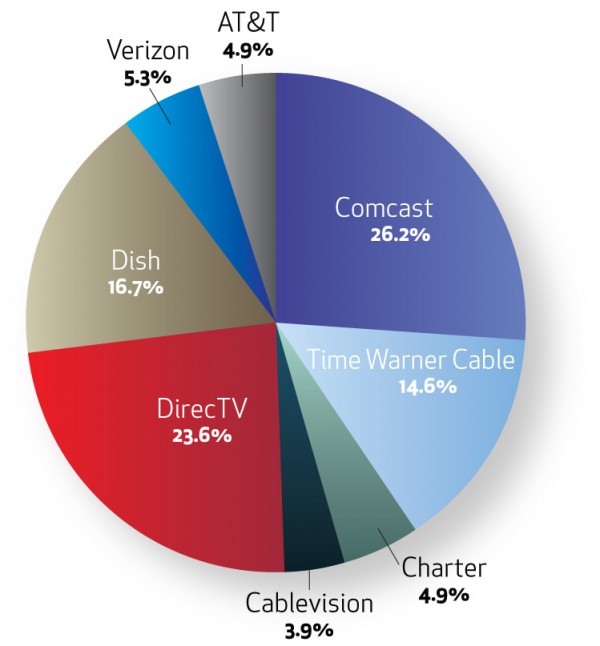NEW YORK TIMES: Comcast is expected to announce on Thursday an agreement to acquire Time Warner Cable for more than $45 billion in stock, a deal that would combine the biggest and second-biggest cable television operators in the country.For Comcast, which completed its acquisition of NBC Universal, the television and movie powerhouse, from General Electric less than a year ago, the latest deal would be its second big act to radically reshape the media landscape in the United States. MORE
PHILADELPHIA INQUIRER: President Obama headlined a big-bucks fund-raiser Thursday night at the Northwest Philadelphia home of Comcast Corp. executive David L. Cohen. Cohen, executive vice president at Comcast and a longtime Democratic Party powerhouse, said the event raised $1 million for the DSCC. Obama nodded and mouthed, “Good job.” Diners at the $10,000- to $32,400-a-plate dinner included Sens. Robert Casey of Pennsylvania and Michael Bennet of Colorado, plus Mayor Nutter. Introducing the president, Cohen referenced the Hebrew term dayenu, an expression of gratitude that means “it would have been enough.” He listed several accomplishments of the Obama administration, including repealing “Don’t Ask, Don’t Tell” and ending the war in Iraq, and after each, the crowd repeated: “Dayenu.” Obama offered his version for Cohen: “If David and Rhonda [Cohen’s wife] had just hosted  one of my first fund-raisers after I’d been elected to the United States Senate, that would have been enough. Dayenu.” He elaborated, prompting laughter: “I have been here so much – the only thing I haven’t done at this house is have seder dinner.” MORE
one of my first fund-raisers after I’d been elected to the United States Senate, that would have been enough. Dayenu.” He elaborated, prompting laughter: “I have been here so much – the only thing I haven’t done at this house is have seder dinner.” MORE
WASHINGTON POST: President Obama raised more than $1.2 million at two campaign fundraisers here Thursday night, the last events of his money-raising blitz in this early stage of the 2012 campaign. Campaign officials said about 800 people, each giving at least $100, attended the first event, at a Hyatt hotel. Later in the evening, Comcast’s executive vice president, David L. Cohen, hosted about 120 people in his home for a dinner, each of the attendees giving at least $10,000 for Obama’s reelection campaign. Cohen, a longtime Democratic operative, has successfully sheparded the regulatory review of Comcast’s merger with NBC Universal earlier this year. MORE
Q: Comcast’s planned $44 billion acquisition of its rival Time Warner Cable makes a lot of sense from a business perspective, but the deal may not bring much joy for their beleaguered subscribers, who have consistently ranked the companies dead last in the industry’s customer satisfaction surveys. The pay-TV industry itself ranks among the least liked US industries, rivaled only by internet service providers—which happen to be largely the same companies. Time Warner Cable and Comcast still get the worst scores in the American Customer Service Index. MORE

HUFFINGTON POST: A BusinessWeek study of 28 mergers between 1997 and 2002 found that customer-satisfaction ratings dropped significantly after the unions, with the effect lasting for years. Cable companies suffered some of the biggest drops in that study. Satisfaction ratings do tend to snap back eventually, as companies scramble to keep customers from fleeing. But after a long history of industry consolidation, Comcast and Time Warner Cable have so little competition that their customers might have nowhere to flee. MORE
USA TODAY: Consumer advocates warn the merger could deepen customer distrust of the companies and the industry as a whole. “The idea that the two largest cable companies are going to get bigger and more powerful is not one the average consumer is going to feel very happy about,” said Phil Swann, president of TVPredictions.com, a website that tracks the TV technology industry. The merger would give Comcast the leverage to demand higher fees from programmers, such as HBO and AMC, and would also likely result in higher fees for consumers, he said. The new megacompany could more readily drop smaller programmers, such as IFC, who don’t agree to new payment schemes, leading to fewer channel choices for viewers. MORE
 USA TODAY: Netflix depends on cable and phone giants — which enjoy formidable market share in the market for broadband services — to deliver its Web-based programming into consumer homes at high data-transfer speeds. Without those speedy connections, watching movies and TV shows over Netflix would be choppy, slow and unreliable. In other words, it would look the way Web video looked back when no one would pay for it. Last month, a federal appeals court threw out so-called Net Neutrality rules that prevented cable and phone companies from discriminating against data traffic sent by Netflix, YouTube and other bandwidth-hogging services. With that protection gone, Netflix will get what connection speeds it can for its more than 30 million U.S. subscribers at the negotiating table. And with one more cable giant that can carry its service removed from the market, its leverage in any talks with Comcast will be weakened, just as Apple’s has been. I wrote last month that the Net Neutrality ruling may not hurt Netflix all that much, yet the proposed Comcast-Time Warner merger would alter significantly the landscape for on-demand video services. MORE
USA TODAY: Netflix depends on cable and phone giants — which enjoy formidable market share in the market for broadband services — to deliver its Web-based programming into consumer homes at high data-transfer speeds. Without those speedy connections, watching movies and TV shows over Netflix would be choppy, slow and unreliable. In other words, it would look the way Web video looked back when no one would pay for it. Last month, a federal appeals court threw out so-called Net Neutrality rules that prevented cable and phone companies from discriminating against data traffic sent by Netflix, YouTube and other bandwidth-hogging services. With that protection gone, Netflix will get what connection speeds it can for its more than 30 million U.S. subscribers at the negotiating table. And with one more cable giant that can carry its service removed from the market, its leverage in any talks with Comcast will be weakened, just as Apple’s has been. I wrote last month that the Net Neutrality ruling may not hurt Netflix all that much, yet the proposed Comcast-Time Warner merger would alter significantly the landscape for on-demand video services. MORE
BLOOMBERG NEWS: For if this deal goes through, customers of Comcast Corp. will probably see prices rise, with no corresponding improvement in service. MORE
Comcast honcho Brian Roberts on CNBC — a channel he friggin’ owns, by the way — describing the purchase of Time-Warner as “a special transaction” that will enhance customer service and competition in the marketplace. When the host presses him on how exactly the concentration of nearly half of the cable market in the hands of one reviled cable behemoth — routinely ranked dead last in American Customer Service Index surveys — would enhance competition and improve customer service Roberts tries to distract him by offering him free HBO for six months. It almost works.

